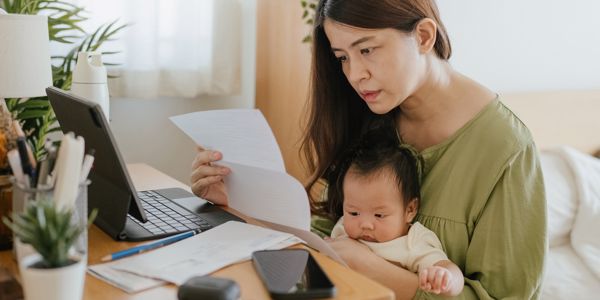No matter what size home you have, there are always things you can do within it to save energy. As the year draws on and autumn approaches, it becomes more urgent to consider ways that we can save energy and, in turn, save money.
In a busy family home with lots going on, it can sometimes feel overwhelming, but if everyone can learn a few simple practices, it will set them up for the rest of their lives.
Once something becomes second nature, you won’t even have to remind everyone to do it.
Turning off Lights in Rooms That Aren’t Being Used
Turning lights off sounds simple enough, if nobody is inside a room, why would you have lights on? But it happens a lot in family homes.
I don’t mean when someone leaves the sofa to go to the toilet, I mean leaving bedroom lights on when the child has been asked to come down and eat their evening meal, or leaving the kitchen lights on after the meal is given out and everyone has already eaten.
Turning lights off in empty rooms can save a lot of energy over time. And getting energy-saving bulbs fitted in all lights for your home is also a step in the right direction too. Remind everyone that if they are leaving any room for longer than a minute, the switches need to go off.
Closing Curtains at Sunset
When you close your curtains, you’re helping to keep heat inside your home, and once the time of year comes for putting the heaters on you’ll definitely notice the difference.
You should be practically choosing to go around your home at the same time every day, closing all the curtains. You will also notice the thermostat won’t need a boost as often if you make sure to close your curtains before it gets dark and the temperature outside goes down, this is saving energy too.
Use Draught Excluders
Yes, those long fabric-filled sausages you get to go by your doors! Not only that specific type, though, there are a whole ton of different excluders on the market these days.
Some are fabric built to be picked up and dropped down into place by your doors; others are attached to the door itself so that when it gets closed, no air escapes beneath it anymore, keeping the heat inside the room and the draughts out.
Often called door seals now, too, they all help to keep the cold out. Normally used on front and back doors, they help save energy by blocking unwanted air flows. It’s amazing the difference either type can make to your home as the seasons get colder.
Thicker Curtains
Investing in some winter curtains helps a lot of families to save energy and keep their homes warmer, especially for the rooms you will be in the most, such as the living room/lounge, They need to be energy efficient and a good set of curtains will help you to do just that.
Shorter Showers
It can be hard to encourage everyone in a busy family household to shower promptly, but limiting the minutes people spend having a shower is a great way to save energy, money and water too!
Try timing family members and suggest they use an alarm or timer on their phone to help them keep track of how long they are running that power shower water. Even cutting it by a couple of minutes will save a lot of energy over time.
Turn Off Appliances
This can work in two parts. Personally, I always turn off appliances that I am not using at the time, such as the microwave, cooker and kettle.
I only turn them on at the wall when I am about to use them. You can also turn off some appliances overnight.
You can save pennies a day, and that will definitely add up over the course of a season or even a year.
Getting into good practice of turning off things that you would usually place on a standby mode will save energy as well as money in the long run.
Here is something to think about: how many items do you leave on standby every night? There are only five things left on in my house overnight, those are the boiler, the fridge freezer, my son’s night light, my broadband router and a USB wall charger that I plug my phone into while I sleep.
Have a look around your home and see if there is anything you can turn off this evening, you’ll be saving energy if you do.
Lower the Thermostat
Quite often, people forget that your thermostat is not only for your heaters but also for your boiler too.
If you’re able to turn both of these down even by a couple of degrees, you will save lots of energy. You may already have a smart meter, or your radiator might have its own dial on the side. Either way keeping it below 20’c will save you some money, you should aim for 18’c unless it’s really cold outside. Encourage your family members to put on another layer of clothing before you reach to turn the thermostat up again too.
Dry your clothes outside when possible
Did you know that on a dry, windy day in autumn, your clothes will still dry outside? They just take an hour or two longer if it’s not warm.
Try and dry outside either on a standing clothes airer or on a washing line as often as you can. Not only does this save money it saves energy, too, you’re not putting on the heating nor using a tumble drier in order to get your clothing dried out.
Sometimes we have no choice but to use a dryer, but you should also be checking your clothes periodically, if they are almost dry, you can turn the appliance off and leave the door closed, the remaining heat will often dry out the last bit of your clothes.
I have a dryer which can tell if there is still moisture in the drum, and it either stops the cycle if it thinks it is dry or it adds on time, this is a great feature of new models, and it helps me to save energy in the winter.
Bulk Cooking
If you’re using the oven or the slow cooker and it will be on for some time, make sure to bulk cook so that you have enough food for tomorrow as well. Heating up leftovers takes a lot less energy than it would be to make another meal from scratch.
I do this with meat sometimes and have the leftovers portioned out in my fridge for the next couple of days. Bulk cooking can also mean that portions can be placed into the freezer, this is great for the following week to save you time and energy; just don’t forget to label what is inside the tub!
Wash Clothes on Shorter Cycles
If your children have lots of clothing in a week, such as a school uniform as well as home clothes, you may find your washing machine seems like it’s constantly in use. But did you know that short and cooler cycles work just as well for clothing that is not heavily soiled, all you need to do is work out how many kilograms your cycles are by looking in the guidebook you had with the appliance?
For example, I can put 4kg in my 8kg machine on a quick cycle; this is only 30 minutes, instead of the two hours of a cotton cycle, so I can get four loads done in the same amount of time. This saves time, energy and water too! Longer cycles use way more water, and it’s often hotter on pre-set washing cycles as well, so make sure you choose one of either 30’c or 40’c to save energy when you do wash clothes next.
Hopefully, all of these ideas will be beneficial to you and your family, and it will help you to save money and energy this coming season. Busy family homes mean that everyone can chip in and help save energy, you can even assign your older children a job.
One is in charge of turning lights off, one for closing the curtains, and perhaps you could reward that help once the routine is established, so everyone benefits from becoming a more energy-conscious household.







